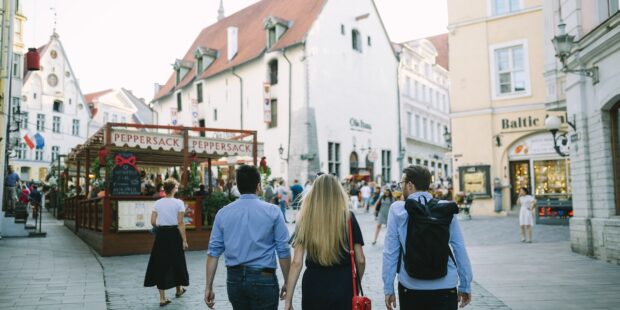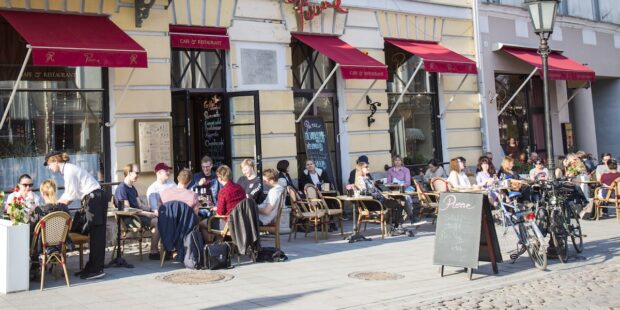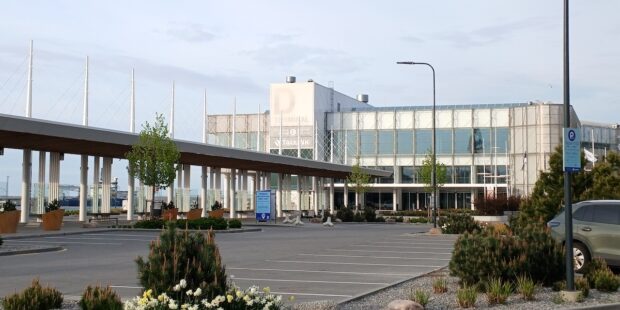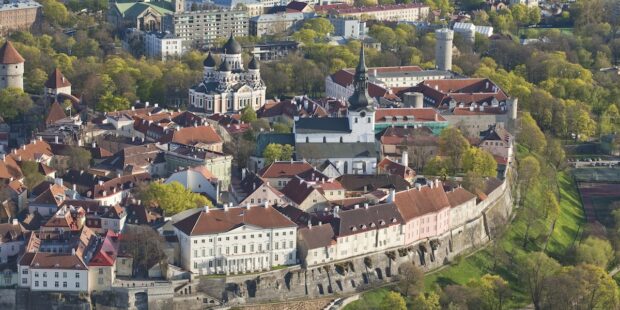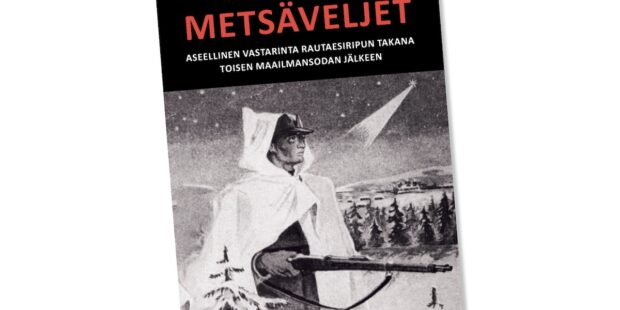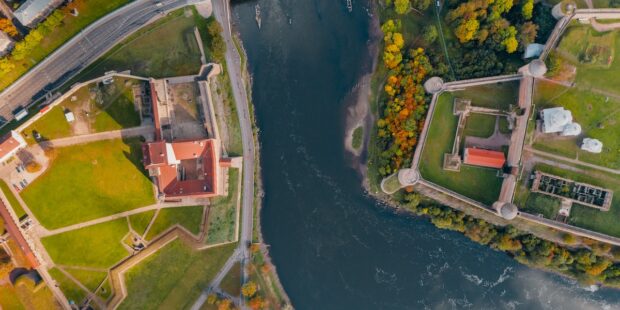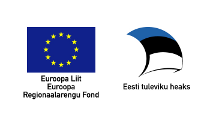Those settling in Estonia need understanding as much as practical support – Settle in Estonia
Text Mark Taylor Photo private collection
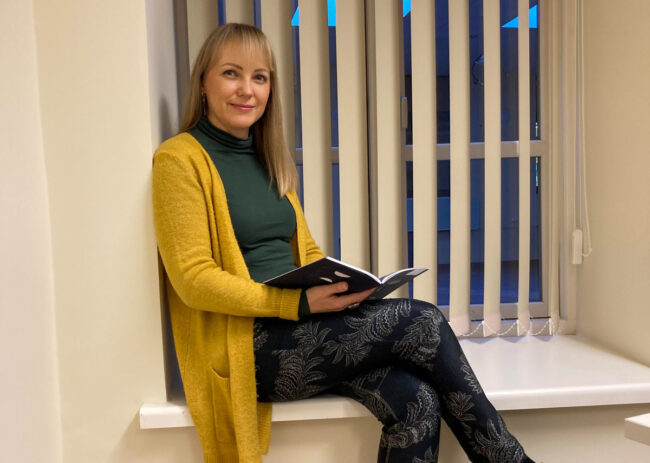 Janika Hango of Tartu Welcome Centre
Janika Hango of Tartu Welcome Centre
Almost every institution that is in contact with foreigners in Estonia has probably had to overcome its own limitations in so many ways this year. Whether related to the number of people that can be served, the number of team members needed, or the understanding of totally new topics and issues that have not been encountered before. The pace at which the constant changes related to welcoming foreigners in Estonia has also been different this year.
The Tartu Welcome Centre, operating opposite the main building of the University of Tartu, is one such institution that has, this year, been in contact with a significantly larger number of foreigners than previously. While the usual annual contact volume of 2,000 people was already surpassed some time ago, this year, the total number will probably be closer to 4,000.
“Usually, around 200 foreigners come to us for consultation per month. But now in August, before the start of the school year, we counselled as many as 800 people who had settled here,” explains the head of the welcome centre, Janika Hango.
The excitement of settling in Estonia has been replaced by the need to survive
In the welcome centre, set up in cooperation between the city of Tartu and two universities, one could previously spot the excitement and sparkle in the eyes of foreigners, as Hango puts it. In her words, it was the excitement of coming to study and live here in Estonia. However, since the beginning of the war in Ukraine, it has been replaced by a survival instinct and a last-straw cry for help. “This is certainly the case in many other institutions as well as ours and it is inevitable,” she notes.
According to Hango, the suddenly increased workload in terms of welcoming foreigners, advising them and issuing the necessary documents, is naturally exhausting not only for the arrivals but also for the officials who welcome them. But in this regard, she advises everyone to put themselves in the shoes of the arrival. “If we ourselves were to go somewhere to ask for help in an unknown situation, how would we like to be treated?” she emphasises. That is why, according to Hango, the welcome centre has focused on finding the necessary solutions to top-priority questions in this new situation, in order to provide faster support to those in need.
The questions and concerns of people arriving from abroad are different today than they were previously
While in the past people approached the Tartu Welcome Centre a while before arriving in Estonia in order to familiarise themselves with the current requirements and the information necessary for adaptation, today a large amount of foreigners directly approach the counselling facility, having arrived in Estonia without prior preparation. As a result, questions about local life and administration are somewhat different than before.
“While until now we mostly answered questions related to registrations, residence, accommodation and medical help. Now, for example, the most asked topics include public transport, issues related to livelihood, children’s educational opportunities or rental spaces,” notes Hango. She also adds that the accommodation topic became critical, especially before the start of the school year, when the competition for rental properties in the university town grew particularly high.
“At the same time, I would like to see a lot more understanding from our local landlords — we all have an obligation, not an opportunity, to register our place of residence. Unfortunately, people often do not want to understand this if they own the property and have these non-existent fears from the old days, even though the owner can cancel the registration of the place of residence for the tenant at any moment,” she notes and adds that, unfortunately, a personal identification number can only be issued to citizens of the European Union if the person has a place of residence in the country.
According to Hango, there could always be more explanation given to both sides — to newcomers and the locals who welcome them. Rules and requirements have been established for a long time and there are institutions through which these can be fulfilled, but for what purpose do we have an ID code or card and what can be done with it, remains unexplained, as it seems to be so evident to we Estonians.
That is why, in addition to the usual operations and counselling, the welcome centre in Tartu offers the opportunity for those arriving in Estonia to complete the free Settle in Estonia adaptation program created by the state, in order to provide answers to such questions.
E-state: for us something ordinary, for foreigners still unbelievable
In Estonia, we are used to the fact that all activities necessary for life can be done online. But it is often a surprise for those arriving from abroad when setting up their local life here in Estonia. Therefore, in addition to the online format, the adaptation trainings organised by the state also take place physically on-site in Tartu as well as in other cities — Tallinn, Jõgeva, Põltsamaa, Haapsalu, Narva, Jõhvi, Kiviõli, Kohtla-Järve, and Kunda, etc.
“The mere fact that our personal identification number is not an arbitrary sequence of numbers, but is the one and only combination that links a person to various state services, needs thorough explanation and should not remain only as an administrative procedure for foreigners,” Hango emphasises to all officials who come in contact with foreigners In Estonia.
According to her, it is necessary to understand that in addition to the Latin alphabet, the tech-savvy environment and systems in which we Estonians use to manage our daily lives, might be something unbelievable to people who arrive in Estonia. “If a person approaches us and admits that they don’t have an e-mail address, or has one but has never used it, then it is clear that all of this information is too much for them at once,” she says, while encouraging people to go further to help and support in these cases.
In addition to practical help, emotional support is extremely important
According to the head of the Tartu Welcome Centre, next to questions related to registration procedures or filling out forms, the need for emotional support has also increased. “People who arrive here because of the war are often not met by any acquaintances, and it may be that the official contact person is their only local contact with the country. This should not be forgotten,” notes Hango and adds that sometimes just having someone listen to their concerns helps a lot.
The centre was able to provide greater support to those who fled here from the war, from a professional psychologist, who also fled Ukraine. Thanks to the initial financial support of the three Rotary Clubs of Tartu and in cooperation with the city government, the Ukrainian psychologist began to advise their local compatriots. “I believe that it is very good and certainly a great help in addition to the administrative tasks that we can help foreigners with,” explains Hango.
In order to share best practices, the centre had the goal of bringing together partners working with foreigners and creating a community dealing with similar topics where they can help each other. But then there was the COVID-pandemic crisis and the war in Ukraine, which delayed this plan. Nevertheless, Hango is optimistic about the future, as there are now definitely even more good practices and accumulated knowledge to share with each other.
What is the Tartu Welcome Centre?
The Tartu Welcome Centre is an NGO, created in cooperation between the city of Tartu, the University of Tartu and the Estonian University of Life Sciences. It’s goal is to help newcomers arriving in Estonia and in the region to adapt and integrate smoothly into Estonian society.
The Settle in Estonia adaptation programme
Settle in Estonia is a national, free-of-charge study programme created for foreigners who have recently moved to Estonia to help them settle into the country and adapt more easily. Over the course of the trainings, an overview is provided of the Estonian state and society, as well as daily local life. In addition, basic-level Estonian language lessons are offered. Trainings can be participated both in-person and online. More information can be found here.
To learn more about this and similar topics
E-State
ID card
Registering in Estonia
Settle in Estonia
Settling in Estonia
Study in Estonia
Tartu Welcome Centre
University of Tartu

